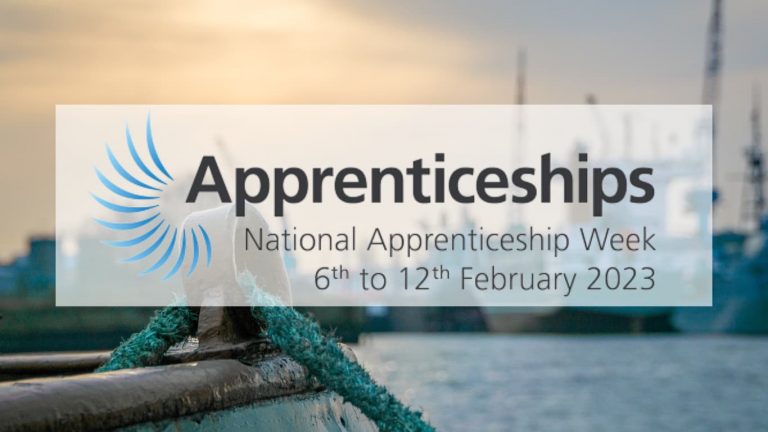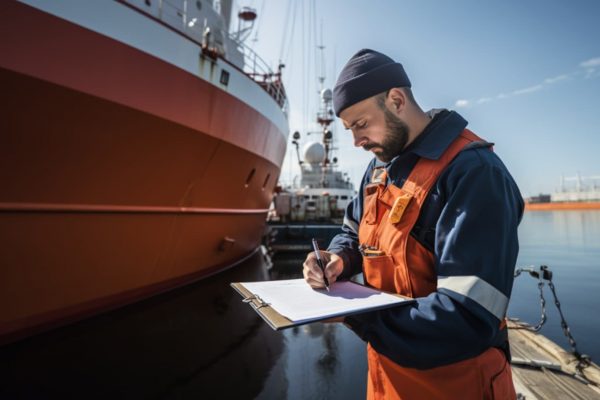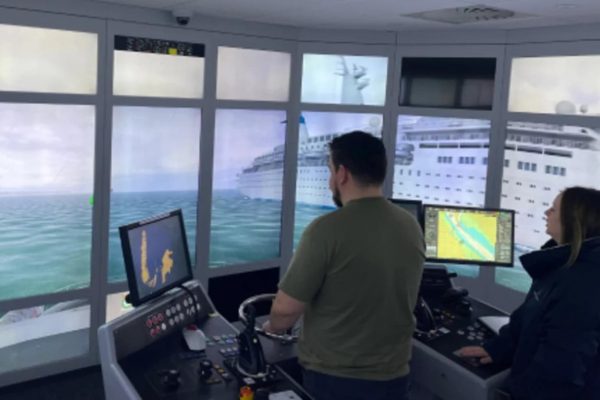National Apprenticeship Week is an annual celebration of apprenticeships and their positive impact on individuals, businesses, and the economy. This year, it takes place from the 7th to the 11th of February, and it aims to promote the benefits of apprenticeships and encourage more people to consider them a path to a rewarding career.
Apprenticeships and cadetships have been an integral part of the UK Maritime Industry for many years, and their significance has only increased recently. The industry faces a skills shortage, and apprenticeships provide a solution to this challenge by offering a structured and effective way to train and develop the workforce. They allow young people to gain hands-on experience and knowledge in the industry while earning a wage. In turn, employers benefit from a highly skilled and motivated workforce contributing to their success and growth. The UK Maritime Industry is constantly evolving, and apprenticeships play a crucial role in ensuring that the industry remains at the forefront of innovation and progress.
The State of Apprenticeships in the UK Maritime Industry
Overview Of Current Apprenticeship Programs In The Industry
The UK Maritime Industry offers a range of apprenticeship programs that cater to different roles and disciplines, including engineering, navigation, operations, and deck and marine engineering. These programs typically last for two to four years, and they combine on-the-job training with off-the-job learning, such as classroom-based training and assessments. The industry has embraced technology and innovation, and many of the apprenticeship programs have been updated to reflect this. For example, some programs now include virtual reality simulations and online learning modules.
We need to work harder to put the S-H-I-P into National Apprenticeship Week. #NAW2023 #SkillsForLife
— Shoreside Maritime Training Magazine (@ShoresideMTM) February 8, 2023
Challenges Facing The Industry In Attracting And Retaining Apprentices
The UK Merchant Navy is facing several challenges in attracting and retaining apprentices, including a lack of awareness of apprenticeships as a career option and a perceived perception of the industry as being outdated. The industry also struggles to compete with other industries regarding wage levels and benefits. This can make it difficult to retain apprentices once they have completed their programs, as they may be tempted to seek employment in other industries that offer higher wages and benefits.
Benefits Of Apprenticeships For Both Employers And Employees
Apprenticeships provide a range of benefits for both employers and employees. Employers, they offer a cost-effective way to train and develop the workforce. They provide access to a pipeline of talented and motivated individuals committed to building their careers in the industry. For employees, apprenticeships offer the opportunity to gain hands-on experience and knowledge in the industry and provide a pathway to a rewarding career. Apprenticeships also allow employees to earn a wage while learning, and they offer the chance to develop valuable transferable skills that can be applied in any industry.
Future of Apprenticeships in the UK Maritime Industry
Industry Initiatives Aimed At Promoting Apprenticeships
The UK Maritime Industry is actively promoting apprenticeships and addressing the challenges it faces in attracting and retaining apprentices. Industry associations, such as the Maritime UK, are leading the charge, working with government agencies and education providers to develop initiatives promoting apprenticeship benefits. These initiatives include careers fairs, school outreach programs, and marketing campaigns to raise awareness of apprenticeships as a viable and rewarding career option.
Proposed Changes And Advancements To Apprenticeship Programs In The Industry
The UK Maritime Industry is constantly evolving, and apprenticeship programs must keep pace with these changes to remain effective. Proposed changes and advancements to apprenticeship programs in the industry include integrating more technology-based learning, developing new and specialised apprenticeship programs, and introducing more flexible and inclusive apprenticeship models that cater to a wider range of individuals. The industry is also exploring alternative models for delivering apprenticeships, such as remote learning and virtual reality simulations, to make them more accessible and appealing to a wider range of individuals.
The Potential Impact Of Technology On Apprenticeships In The Maritime Industry
Technology is playing an increasingly important role in the UK Maritime Industry, and it is expected to impact apprenticeships in the years to come significantly. The integration of technology-based learning will allow apprentices to gain hands-on experience with the latest equipment and systems and provide them with the skills and knowledge they need to succeed in a rapidly changing industry. Virtual reality simulations and remote learning will also make apprenticeships more accessible and appealing to a wider range of individuals, allowing apprentices to receive training and support from industry experts regardless of their location. The potential impact of technology on apprenticeships in the UK Maritime Industry is significant, and it has the potential to transform the way that apprenticeships are delivered and experienced.
Conclusion
Apprenticeships play a crucial role in the UK Maritime Industry, providing a pathway to a rewarding career and ensuring that the industry has a pipeline of talented and motivated individuals to drive its continued growth and success. National Apprenticeship Week is a time to celebrate apprentices’ achievements and raise awareness of the opportunities that apprenticeships provide. The industry faces challenges in attracting and retaining apprentices, but these challenges are being addressed through industry initiatives and proposed changes and advancements to apprenticeship programs. The future of apprenticeships in the UK Maritime Industry is bright, with technology playing an increasingly important role in their delivery and impact. The UK Maritime Industry is committed to promoting and advancing apprenticeships and ensuring they continue playing a key role in the industry’s future.




